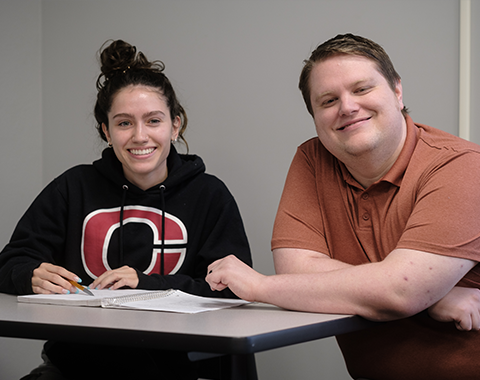Picture yourself standing in the operating room, expertly assisting surgeons while ensuring the safety of the patient on the table. Give us two years, and that can be you. Our accredited program prepares you for the Certified Surgical Technologist exam. Iowa's Last-Dollar Scholarship may even cover your tuition.
What You Learn in Surgical Technology
Learn to handle instruments, supplies, and equipment used during surgical procedures. How to arrange and sterilize equipment, and more. You build knowledge about different procedures, how to anticipate the needs of the surgeon, and ensure quality patient care. You also complete two operating room clinicals.
What Can I Do With a Surgical Technology Degree?
As an allied health professional, you are an integral part of the team. You ensure the operating room is safe, equipment functions properly, and patient safety is maximized. Work in medical and surgical hospitals, outpatient care centers, and doctor and dentist offices. You could also manage a sterile processing department, go into medical device sales, or even teach the next generation of surgical techs.
A Solid Foundation
Intro to Surgical Technology
Start here
Intro to Surgical Technology
Build knowledge and skills, and take part in lab simulations
Human Relations
Contribute
Human Relations
Study personality characteristics, behavior, and what motivates individuals and groups.
Pharmacology
How to handle
Pharmacology
Learn about drug identification, administration, classification, and more.
Advanced Concepts
Go deeper
Advanced Concepts
Specific surgeries related to disease processes.
Similar Programs
Not quite right? Consider these instead:
See our health programs in action
Eastern Iowa Community Colleges hosted a live, multidisciplinary healthcare simulation at the Scott Community College Health Sciences Building.
This 75-minute simulation followed the case of a 28-year-old pregnant patient who experiences an eclamptic seizure during a routine dental cleaning. After stabilization, first responders observe potential signs of intimate partner violence (IPV), prompting full collaboration between healthcare providers, emergency personnel, and health information management (HIM) professionals.
More than 30 EICC students participated in the simulation.
Ready to go?
If this is the career for you, don't wait. Read these then apply!
After you start the program you must:
- Have an insurance plan to cover any injury or illness requiring hospital treatment or surgery.
- Submit evidence of good health through a physical exam and immunization form.
- Provide documentation showing you successfully completed an American Heart Association CPR course for health care providers.
A criminal background check is required prior to entering any clinical setting. Any associated fees will be your responsibility. Certain criminal activity may disqualify you from participation and the program.
You must provide your own transportation to all clinical placements, including any outside of the Quad Cities region.
In addition to EICC's general admission requirements, you must meet with the program director prior to placement in the program. It’s a chance for them to tell you about program requirements, course sequence, application for certification, and clinical/programmatic information. Complete your admissions application then schedule your conversation with:

Denise Duran, CST, Program Director
You must achieve a "C" or higher in each course to progress to the next term.
The Surgical Technology program prepares you to sit for the National Board of Surgical Technology and Surgical Assisting (NBSTSA) Certified Surgical Technologist (CST) exam.
State licensure is not required in all states, and if it is, requirements may vary. Graduates who apply for licensure may need to satisfy other requirements, such as completing an application, or paying a fee. We make every effort to verify the information provided on requirements for licensure is accurate and up to date, however, these requirements are subject to change at any time. If you will be seeking licensure, we encourage you to review the requirements for the state in which you intend to practice.
There is no state licensure requirement in Iowa, but most hospitals require CST certification. Our program meets the educational requirements for licensure in Illinois. Here's more information from the Illinois Department of Financial and Professional Regulation.
Tour the Surgical Technology Lab

Iowa's Last-Dollar Scholarship
You may be eligible to earn a degree in this high-demand field for zero tuition costs! File for financial aid and if you qualify, the state covers the remaining balance beyond the aid for which you are eligible. More than two dozen career programs qualify, including this one. File your FAFSA by July 15.
Learn More
Tutoring
Need some extra help? We offer drop-in and scheduled tutoring on each campus, and online, too. You can also get a writing consultation via email. Visit our tutoring centers for more information on services and schedules.
EXPLORE ACADEMIC RESOURCESYour Degree = Success
Complete your education in two years. Qualify for better jobs. Earn a higher salary. Enjoy a better quality of life. The benefits of an associate's degree are impressive and wide-ranging.
Explore the value of an associate’s degreeEmployment and Wage Outlook
How to Pay for EICC
College is more affordable than you think, especially when you factor in federal and state aid, loan options, scholarships, institutional grants, and Work-Study.
Contact Admissions
Contact the admissions representative from the college you plan to attend. If you’re not sure, you may contact any rep. Each can answer questions about any college or program.
Office Hours: Monday - Friday, 8 a.m. - 4:30 p.m.
Request InfoCommission on Accreditation of Allied Health Education Programs
25400 U.S. Highway 19 North, Suite 158
Clearwater, FL 33763
Phone: 727-210-2350
Fax: 727-210-2354
For general questions about CAAHEP, please contact mail@caahep.org.
ARC/STSA: Accreditation Review Council on Education in Surgical Technology and Surgical
Assisting
6 W. Dry Creek Circle, Suite #110
Littleton, CO 80120
Phone: 303-694-9262
Fax: 303-741-3655
info@arcstsa.org
Surgical Technology: Locations
Scott Community College
500 Belmont Rd.
Bettendorf, IA 52722
Map and Directions


